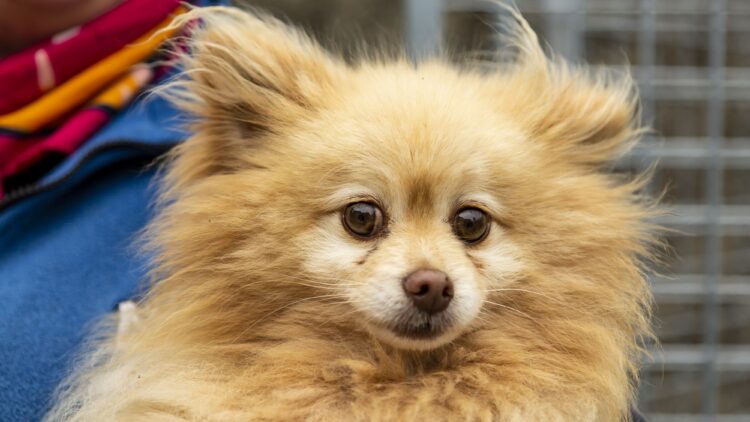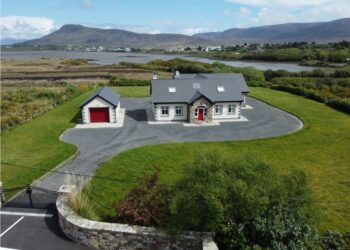Fiona Gammell of Wicklow Animal Rescue has spent nearly 50 years rescuing dogs. Here, she shares an insight into the plight of the large number of dogs in rescue, and why this problem persists in Ireland.

Ireland is a nation of dog lovers. We are spending more than ever on quality foods, grooming, insurance and even doggy day care to ensure that this four-legged family member has the best life we can give it.
However, Ireland is described as the puppy farm capital of Europe. People are seeking out a picture perfect pup, without realising or caring about the consequences that demand brings.
Fiona Gammell of Wicklow Animal Rescue explains that Irish rescue centres are inundated with requests to take in unwanted animals.
“People in rescue are doing so much unrecognised work. Sometimes you feel, if we stopped for one day, the impact that that would have, it’s like what people say about if nurses stop, how disastrous it would be,” Fiona says.
This isn’t a new problem. Fiona has been rescuing dogs for 48 years, since she was just 12 — back then she was using her pocket money to get her neighbours’ dogs neutered, to prevent unwanted puppies being born.
“Something didn’t sit right with me even back then that instead of neutering animals people were drowning them or abandoning kittens and puppies. In those days, no one had any money and it was a lack of understanding,” she says.
“But now it isn’t lack of education or funds, as you can find free neutering. I feel that there is an apathy, people just don’t care.”
Fiona has vast experience in animal welfare, and is the type of person who never stops learning. At 50, she studied law, and she also studied farming at Kildalton. Before setting up Wicklow Animal Welfare in 2006, she was vice-president of Wicklow Society for Prevention of Cruelty to Animals.
After realising that other organisations and cruelty inspectors were reluctant to engage with the Travelling community, Fiona decided to work with them, to educate them about the need for neutering and to rescue any pups that were born from unnecessary breeding.
“The animals that needed us most were being ignored and I had to do something about it. It’s amazing for me to see the effect it has had, Travellers are coming to me wanting to get their dogs neutered,whereas that didn’t happen before,” Fiona says.
“They know now that it is cruel to ‘dock’ or cut a dog’s tail — it was a tradition to do it before, they just thought that they had to do it. That is the importance of education.”
If someone wants to her to take on a litter of puppies at the rescue, Fiona will only do so if she can neuter the mother, as she doesn’t want to deal with a litter of pups from that same dog down the line. She paints a bleak picture of what Ireland would look like if neutering doesn’t happen.
“We don’t get the litters that we used to anymore thankfully which is amazing, as it must mean that people are listening. Because if you take one lurcher greyhound cross bitch, that has two litters a year, that is 20 pups a year, so over a 10 year breeding period unstopped, that is 200 dogs,” she says.
“To me, prevention is always better than cure, so we should be preventing this situation from happening rather than trying to deal with the consequences.”

She and her husband run a kennels as their business, and are dependent on donations to run the charity. At the rescue she will also vaccinate, treat for mange, fleas and she operates a no-kill policy.
It’s not just abandoned or neglected dogs that end up in rescue, Fiona explains. She has heard every excuse that you can think of as to why owners want to get rid of their dog.
“People complain that it is too hard to get a dog from a rescue as we are too tough, but I don’t believe we are tough enough. We hear all of the reasons that people want to get rid of dogs — they’re moving house, the landlord doesn’t allow dogs, the other dog doesn’t like it, we’ve had a baby, he chased a sheep,” Fiona says.
She is frank about the role dog owners have to play in this crisis.
“Something happens and people think it is the dog’s fault and that it has to go, but it is never the dog’s fault. The pup will only do what you allow it to do,” she says.
“People turn them into babies, and my real problem is with the people who turn them into babies until the real baby comes along. Suddenly the dog isn’t number one any more and the dog doesn’t understand. You can’t expect the dog to slot in like a little brother or sister.”
Fiona points out that if a dog has been in a position that it bites someone or chases farm animals, then it was owners who allowed that to happen. It is a matter of protecting others, but also protecting your dog.
She believes that we have forgotten how to let dogs be dogs.
“We want them to be mini-people. We have confused dogs. We are expecting them to take care of us, but then we don’t want them to growl or bark. It is in their nature to be predators, to chase and run,” Fiona says.
She takes in about 300 dogs a year and 250 of those are sent to rescues in England where there is a high demand for Irish dogs. Fiona had been reluctant initially to send dogs to the UK, because “Ireland is known for exporting our problems”. But she has learned the hard way that it is difficult to find good homes for dogs in Ireland.
She keeps between 30-50 dogs in the rescue at one time.
“The day a dog arrives I ask myself if I could find a home for it in Ireland. If not, I send it to the vet to be neutered, vaccinate it for rabies and apply for a passport that day. About a month later the dog should be ready to go, but of course some dogs are more difficult, they might be too nervous or it might take longer to rehabilitate them.”
Fiona has 12 dogs in her own home, rescues she couldn’t allow to be rehomed — even though they are clearly adoring, loving pets. Two of them have been known to snap, the others have their quirks, but when we walk in, after some very loud and overwhelming excitement, the dogs all settle down, sleeping in their corners or jumping into our laps to be petted. An affectionate German Spitz stole our hearts — it was hard to believe that if it wasn’t for Fiona, it wouldn’t have a home.
“All dogs can be rehabilitated. I’m not saying everyday is perfect here, some days two could fight a bit to get to the food bowl, but most days they are queueing up to take their turn like a Russian bread line, which is a funny sight to see.
“There is a solution to every problem but you have to want to solve it. Really, you should have prevented the problem of starting in the first place,” she says.
With such a sheer volume of dogs on the premises, one would imagine that the place is a bit of a madhouse. But the grounds, the kennels and the rescue facilities are all well kept and bar the odd moment of barking from the dogs, this hidden haven in Wicklow is peaceful.
“I want their time here to be as pleasant as can be. Here is like heaven after what they have been through. They have a dry bed, good food, and they get to run free in the fields twice a day,” Fiona says. “You see it after a few days they start playing like a pup again. Up until that point they have been under so much pressure all their lives.”









